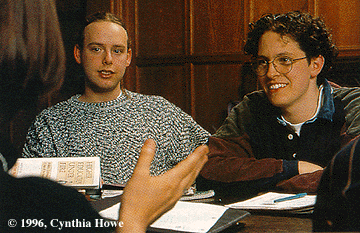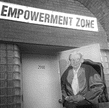
The University of Chicago Magazine
August 1996

Reports look to Chicago's future
 Helping hand: Among its findings, the quality-of-student-life task force revealed a need for increased support services and longer term breaks to help alleviate academic stress.
Helping hand: Among its findings, the quality-of-student-life task force revealed a need for increased support services and longer term breaks to help alleviate academic stress.In the late 1950s, it was the Executive Committee on Undergraduate Education, which began a bold process of revamping the College's curriculum. And in the 1980s, the Baker Commission sparked major reforms in graduate education. Throughout its history, the University has embraced such exercises in critical self-evaluation as the best way to appraise its strengths and weaknesses against the standards of both traditional academic excellence and future challenges.
That process was renewed with vigor in 1994, when then newly appointed President Hugo Sonnenschein called for the formation of three campuswide task forces, charged with reviewing undergraduate and graduate education and the quality of student life. This past spring, those task forces submitted their findings. Their observations reflect both the pressing need to improve non-academic services for students (many of the reports' suggestions have already been implemented) and more long-term goals to maintain academic distinction in light of financial challenges faced by the University and within higher education generally.
The Task Forces on Undergraduate and Graduate Education--chaired by Robert Zimmer, mathematics professor and associate provost, and Daniel Garber, the Lawrence Kimpton distinguished service professor in philosophy and associate provost-- submitted a combined report in March. The result of work by several dozen faculty members, it examined issues ranging from the size of the faculty, the College and graduate programs to policies on financial aid, graduate-student teaching, and the mix of master's and Ph.D. programs.
The report notes that the University faces particular financial pressures: Unique among its peers in its relatively small undergraduate population, Chicago offers more need-based financial aid to its undergraduates than any of its peer institutions. Thus, it is the only major university for which the wage base of the faculty in the arts and sciences exceeds the net undergraduate tuition. Its historically small College also means fewer College alumni, typically the most generous supporters of endowment.
In considering how Chicago might respond to these issues, the task forces did not attempt to recommend precise pathways. "Our goal has not been to offer a particular solution," said Zimmer, "but to emphasize the academic challenges we face and to articulate the academic values we must keep in mind" to maintain and enhance the quality of the institution.
Regarding undergraduates, the report highlights the need for an even greater sense of involvement in the undergraduate curriculum by all faculty and departments. "There is an enormous capacity for the faculty as a whole to contribute further to these efforts,"wrote the report's authors, calling upon each department to formally review its undergraduate program and requirements, as well as its efforts to foster a departmental community with undergraduate concentrators and its faculty's participation in the Core.
The undergraduate section also suggests considering ways to maintain the high quality of the College's students, from innovations in awarding financial aid to the most able applicants to improvements in the overall quality of student life.
The report's graduate segment emphasizes the need to maintain the distinctive, highly interdisciplinary work of the faculty and graduate students. But it notes that financial pressures require that many aspects of graduate education be evaluated, including the relative sizes of Ph.D. and master's programs, how aid is awarded, and the role of graduate teaching.
"It is time to reevaluate our priorities in light of new realities," said Garber. While changes must be made, he added, Chicago's character does not need to change: "It is obviously important for us to continue to be a great graduate research and educational institution."
In its mid-May report, the task force on the quality of student life, chaired by geophysical-sciences professor Susan Kidwell, recommended a range of specific actions--from lengthening breaks between academic terms to capitalizing on alumni as resources, role models, and mentors--in support of five "strategic goals":
* Reduce factors that unnecessarily aggravate academic stress.
* Increase students' sense of social community.
* Foster an institutional policy that clearly values students.
* Increase assistance to students in developing plans and skills for life after graduation.
* Broaden awareness of the institution and the talents of its students both inside and outside the University.
Some of the task force's specific recommendations, the report noted, have already been at least partly implemented, including expansion of the fall Orientation program for first-year students, and renovation of the Reynolds Club for informal social gatherings.
In this department: - The Campaign for the Next Century tops its $650 million goal.
- Two new centers--studying poverty and race in the United States--are now open.

The portrait of former University President Hanna Gray was stolen--then returned. Then stolen again--and returned again.- The University recognizes great teachers with its annual teaching awards

The portrait of former University President Hanna Gray was stolen--then returned. Then stolen again--and returned again.
Plus items For the Record.
Go to:
- INVESTIGATIONS
- CHICAGO JOURNAL
- EVENTS
- LETTERS
- CHICAGOPHILE
- Feature story, a profile of George Gruhn, AB'67, "Would you buy a used guitar from this man?"
- Feature story, drawings from Reunion 1996 in June, "Scenes from a Reunion"
- Feature story, a profile of Abner Mikva, JD'51, "Dissenting Opinion"
- CLASS NEWS
- DEATHS
- BOOKS
- IN THE CLUBS
- ALUMNI AWARD-WINNERS